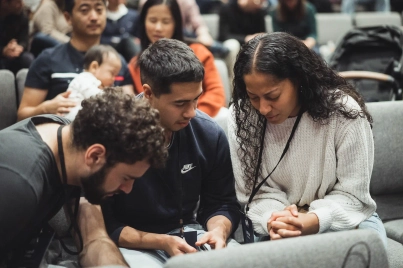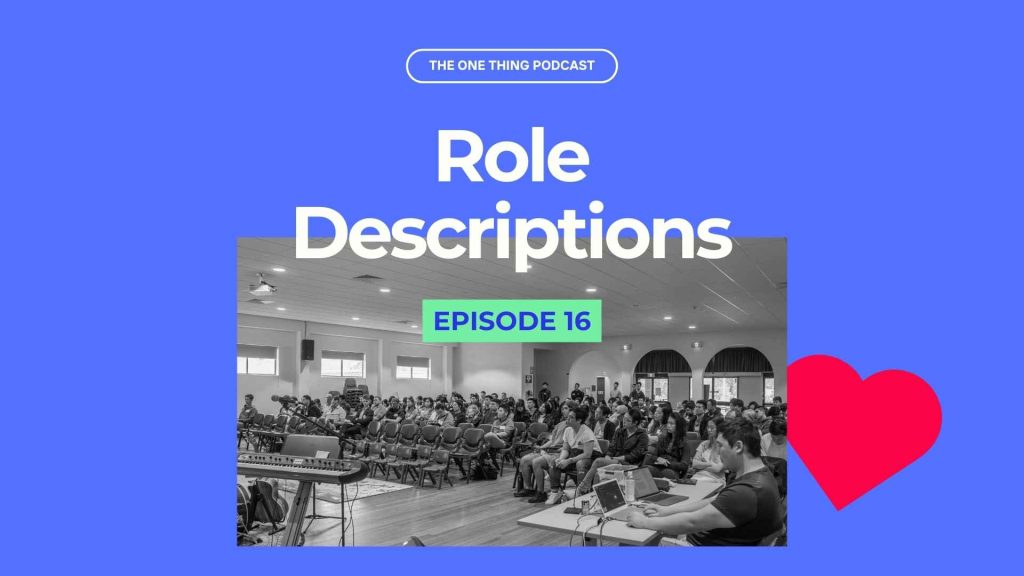Church can feel like 80% of the work is being done by 20% of the people. It’s hard enough to just organise a Sunday roster, let alone to establish healthy, sustainable teams of believers gladly serving shoulder to shoulder. This can leave our members feeling exhausted and exasperated, knowing that Sunday is always less than a week away.
Mobilising Christians to serve isn’t simply a church issue, it’s also an issue of individual discipleship. A key part of growing in Christlikeness is growing in servant-heartedness. A Christian who shows no interest in laying down their lives for others hasn’t grasped the full implications of the gospel.
Through sustained attention to convictions, we can begin to foster a culture of glad, sacrificial service. As you kick off church teams in 2024, here are resources to help you reflect on how your church is going at mobilising people to serve.
If you only have time to listen to one talk, make it this one. Grahame Fuller from EV Church shares an incredibly helpful framework for helping your church be empowered to serve effectively.
“A team member thinks and plans for next week’s ministry. The team leader thinks and plans a term ahead term at a time. The church leader thinks and plans a year two years, three years, five years at a time.” – Grahame Fuller
James Galea (The Bridge Church, Sydney), Katy Annis (Trinity Church Colonel Light Gardens, Adelaide) and Scott Curtis (Hunter Bible Church, Newcastle) share their failures and successes at our 2022 National Conference.
“By 2018 we needed 70 volunteers to run a Sunday gathering. The puzzle of putting that together had become challenging, and more importantly, limiting for people and for our ministries.
We’d built a particular culture of serving in our church, and it wasn’t at all an unhealthy culture. We had lots of really faithful people who wanted to serve, and they did it graciously and cheerfully. But most of the organising was done by staff, because we’d set it up that way.
We’ve worked on shifting the culture from a list of jobs to be done on a Sunday to encouraging and equipping God’s people to love and own their ministry, and to grow together as they did that.
Changing that culture was a very big shift in our church family. We poured a significant amount of time and resources into it. And to be honest, very honest, it’s still a work in progress. Three years later, I think it’s well worth it. But it’s a time investment.” – Katy Annis
Learn from Derek Hanna’s mistakes from when he was developing leaders at his church plant. This episode of The One Thing discusses church plans for developing leaders, leadership pipelines and the 70/20/10 framework of adult learning.
“I have made this mistake personally. You assume that because someone is very good at doing a particular task within a team, that they will also have the skills and ability to lead a team.
For example, someone might be good at leading a growth group. And therefore, you think they’ll be good at leading the leaders who lead growth groups. Well, now, that is not true.
My mistake has been that I just take people and I drop them in those positions, assuming that things will magically happen. And that’s unfair on them and it has a huge ripple effects for everyone else around them.
There are different skills in leading teams and leading leaders than there are in doing particular roles within church. And we need to acknowledge that and develop them into those roles.” – Derek Hanna
The end of every year can feel like a struggle to recruit volunteers for church teams. What are the best systems to recruit people across different ministries? How early is a member of church invited to be involved in ministry? Are there different ways for recruiting for different ministries? And can we create a culture of serving across the whole church? Hear from Cathie Heard and Derek Hanna on The One Thing podcast.
“We are surrounded by endless amounts of need. It can feel like though no matter how much vision we cast, how much we talk about opportunities, how much we fire people up – it can be hard to move people to actively serving within the church.
Everything can quite easily fall back on the few who are willing, the few who may have time or the few who are paid.
So the question is – how you get out of this cycle? How do you not just talk about the priesthood of all believers? But how do you actively help people be engaged in the mission of the church day to day?” – Derek Hanna
Let’s be honest – no one gets excited about writing role descriptions (if you do, praise God), but loving people often means writing good ones. Scott Sanders and Derek Hanna are on The One Thing podcast.
“Role descriptions allow us to empower people effectively and give them clear boundaries to work within. Role descriptions for someone on the sound team often just say, “Turn on the main speakers first, then the computer. If you don’t do it in that order you’ll blow up the system.” That’s all key information, but role descriptions need to be broad and give people an outcome to work towards – “Your role is to ensure that people clearly hear the preached word of God.” That gives the volunteers an opportunity to think about how to do things better.” – Scott Sanders
If you’d love to keep learning from experienced ministry practitioners from around Australia, the best place to do that is at Reach Australia’s National Conference in May 2024. Join 1,000+ gospel workers sharing their wisdom so that our churches are healthy, evangelistic and multiplying. Tickets are on sale now and selling fast.






